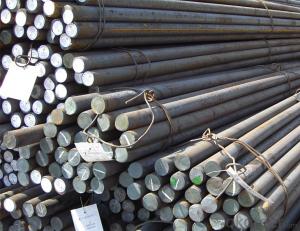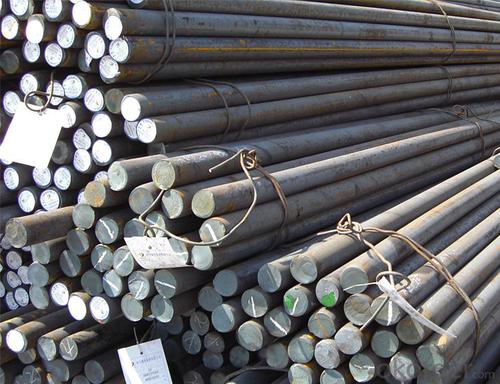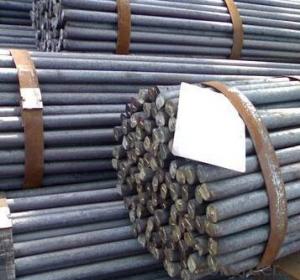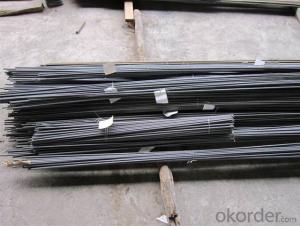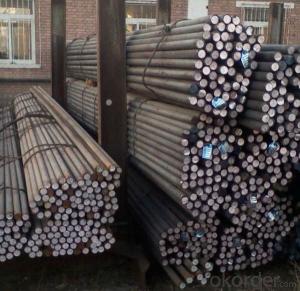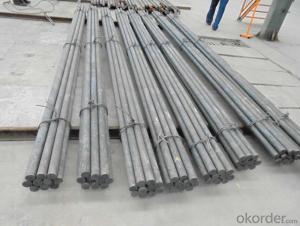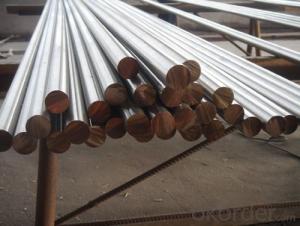Round Bar Reinforcing Steel Bars Q195 Special Steel
- Loading Port:
- China main port
- Payment Terms:
- TT OR LC
- Min Order Qty:
- 30 m.t.
- Supply Capability:
- 10000 m.t./month
OKorder Service Pledge
OKorder Financial Service
You Might Also Like
Specification
Chemical composition of steel bar
| Standard | C | Si | Mn | Cr | Ni | P/S ≤ |
| DIN | ≤0.15 | ≤1.0 | ≤2.0 | 18 | 9 | 0.03 |
| GB | ≤0.15 | ≤1.0 | ≤2.0 | 18 | 9 | 0.03 |
Product show
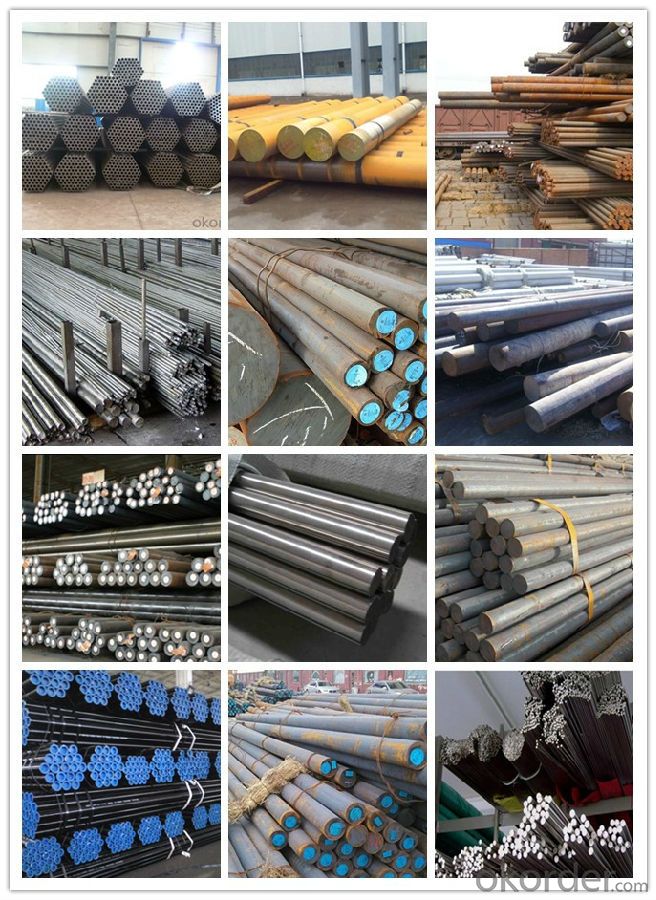
Workshop show
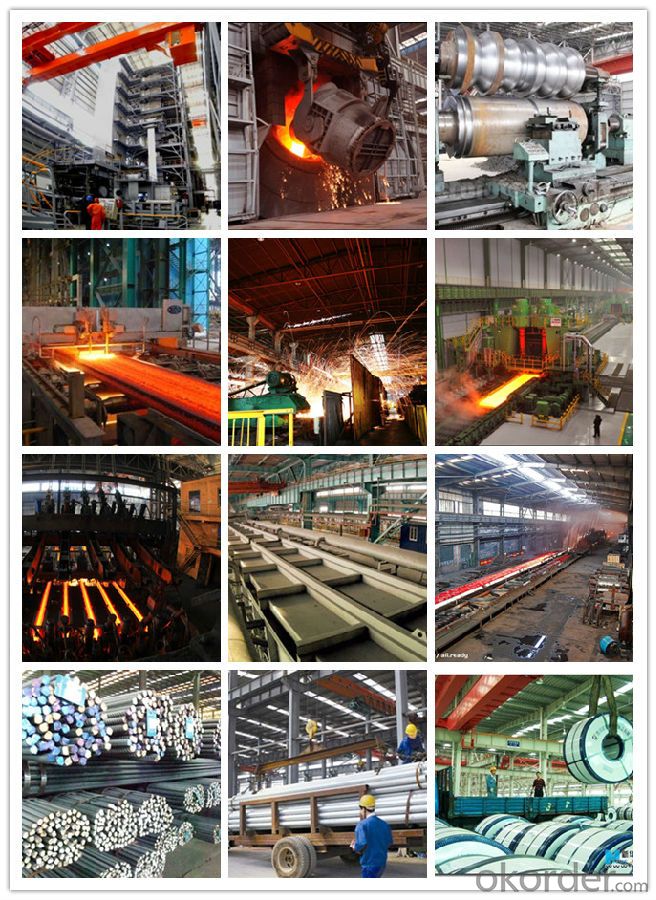
Shipping
1. FedEx/DHL/UPS/TNT for samples, Door-to-Door;
2. By Air or by Sea for batch goods, for FCL; Airport/ Port receiving;
3. Customers specifying freight forwarders or negotiable shipping methods!
Delivery Time: 3-7 days for samples; 5-25 days for batch goods.
Payment Terms
1.Payment: T/T, L/C, Western Union, MoneyGram,PayPal; 30% deposits; 70% balance before delivery.
2.MOQ: 1pcs
3.Warranty : 3 years
4.Package Informations: 1) EXPORT, In 20 feet (GW 25 ton) or 40 feet Container (GW 25 ton)
2)as customer's requirement
Main Product
Plastic Mould Steel
DIN 1.2311,1.2738,1.2083,1.2316 etc.
AISI P20,P20+Ni,420 etc.
JIS SUS420J2
Hot Work Steel
DIN 1.2344,1.2343,1.2367,1.2365,1.2581,1.2713 etc.
AISI H13,H11,H10,H21, etc.
JIS SKD61,SKD6,SKD5,SKT4 etc.
Cold Work Steel
DIN 1.2739, 1.2601, 1.2080, 1.2436, 1.2631, 1.263, 1.2510, 1.2327 etc.
AISI D2, D5, D3, D6, A8, A2, O1 etc.
JIS SKD10, SKD11, SKD1, SKS3 etc.
High Speed Steel
DIN 1.3343, 1.3243, 1.3247, 1.3355 etc.
AISI M2, M35, M42, T1 etc.
JIS SKH51, SKH35, SKH59, SKH2 etc.
Alloy Structural Steel
DIN 1.7035,1.6511,1.7220,1.7225 etc.
AISI 5140, 4340, 4135, 4140 etc.
JIS SCr440,SNCM439,SCM435,SCM440 etc.
Stainless & Carbon Steel or Others
DIN 1.4125,1.1191 etc
AISI 440C,1045, 1020 etc.
JIS SUS440C,S45C etc
Why choose us?
(1) The leading exporter in China special steel industry.
(2) Large stocks for various sizes, fast delivery date.
(3) Good business relationship with China famous factories.
(4) More than 7 years steel exporting experience.
(5) Good after-sales service guarantee.
- Q: How does the availability of raw materials affect the production of special steel?
- The production of special steel heavily relies on the accessibility of raw materials. Special steel, renowned for its outstanding strength, durability, and corrosion resistance, is widely used in industries like automotive, aerospace, and energy. The availability of raw materials, including iron ore, coal, chromium, nickel, and molybdenum, directly affects the production of special steel. These materials are crucial for the composition and characteristics of the steel. Any disruptions in their supply can significantly impact the production process. If the availability of iron ore, which is the primary source of iron, becomes limited or expensive, it can result in a scarcity of the main ingredient for steel production. Consequently, the production of special steel may decrease, leading to higher prices and potential shortages in the market. Similarly, the availability and cost of alloying elements play a vital role. These elements enhance the properties of steel, making it suitable for specific applications. For instance, chromium improves corrosion resistance, while molybdenum enhances strength at high temperatures. If these alloying elements are not readily available, it may hinder the ability to produce special steel with the desired properties. Moreover, the availability of energy resources like coal or natural gas is crucial for special steel production. These resources are used in the steelmaking process, particularly in the production of coke, which is essential for smelting iron ore. Limited availability or increased prices of energy resources can impact the cost and efficiency of steel production. In conclusion, the availability of raw materials plays a vital role in the production of special steel. Any disruptions or limitations in the supply of raw materials, including iron ore, alloying elements, and energy resources, can have a significant impact on the production process. This can result in higher prices, potential shortages, and compromised properties of the final product. Thus, ensuring a stable and sufficient supply of raw materials is crucial for the production of high-quality special steel.
- Q: How does stainless steel contribute to the automotive industry?
- Stainless steel contributes to the automotive industry by providing strength, durability, and corrosion resistance in various automotive components such as exhaust systems, body panels, and engine parts. Its ability to withstand extreme temperatures and harsh conditions make it a preferred material for manufacturing high-performance vehicles. Additionally, stainless steel's aesthetic appeal and low maintenance requirements make it suitable for decorative purposes in car interiors and exteriors.
- Q: How does special steel contribute to the manufacturing of bearings?
- Special steel plays a crucial role in the manufacturing of bearings due to its unique properties and characteristics. Bearings are mechanical components that facilitate smooth rotation or movement between two surfaces. Special steel, also known as bearing steel, is specifically designed to meet the demanding requirements of bearing applications. Firstly, special steel offers exceptional hardness, which is crucial for bearings to withstand heavy loads and high-speed rotations. The hardness of the steel allows the bearing to resist wear and deformation, ensuring a longer lifespan and reliable performance. Secondly, special steel possesses excellent corrosion resistance. Bearings often operate in harsh environments where they are exposed to moisture, chemicals, and other corrosive substances. The special steel used in bearing manufacturing effectively prevents rust and deterioration, ensuring the bearings can withstand these challenging conditions. Furthermore, special steel has superior heat resistance and thermal stability. Bearings can generate significant heat during operation due to friction and pressure. The special steel used in their production can withstand high temperatures without losing its structural integrity, preventing premature failure and ensuring consistent performance. Additionally, special steel offers exceptional strength and toughness. These properties are vital for bearings to withstand the intense forces and impacts they experience during operation. The high strength and toughness of the steel prevent fractures, breakages, and other forms of damage, contributing to the overall durability and reliability of the bearings. Lastly, special steel has excellent dimensional stability and machinability. This allows for precise manufacturing and shaping of the bearing components, ensuring accurate dimensions and smooth surfaces. The dimensional stability of the steel ensures that the bearings can maintain their proper fit and alignment within the machinery, minimizing any potential issues or malfunctions. In conclusion, special steel is essential in the manufacturing of bearings due to its hardness, corrosion resistance, heat resistance, strength, toughness, dimensional stability, and machinability. These properties enable bearings to withstand heavy loads, high speeds, harsh environments, and intense forces, ensuring reliable and efficient operation in a wide range of applications.
- Q: What are the limitations of using special steel in electrical applications?
- There are several limitations to using special steel in electrical applications. Firstly, special steel can be more expensive compared to other materials commonly used in electrical applications, such as copper or aluminum. This can make it less cost-effective, especially for large-scale projects. Another limitation is that special steel has a relatively high electrical resistivity compared to copper or aluminum. This means that it is less efficient in conducting electricity, leading to higher energy losses and lower overall efficiency in electrical systems. This can be particularly important in applications where energy efficiency is a priority, such as in power generation or transmission. Additionally, special steel is generally less malleable and ductile compared to other materials like copper. This makes it less suitable for applications that require shaping or forming, as it can be more difficult to work with and may require more complex manufacturing processes. Furthermore, special steel is more prone to corrosion compared to materials like copper or aluminum. This can be a significant limitation in electrical applications, particularly in environments with high humidity or exposure to moisture. Corrosion can lead to degradation of the steel's electrical properties, reduce its lifespan, and increase maintenance and replacement costs. Lastly, special steel may not be as readily available or easily sourced as other materials commonly used in electrical applications. This can pose challenges in terms of availability, lead times, and potential supply chain disruptions, which may impact project timelines and overall productivity.
- Q: How is stainless steel used in the production of kitchen utensils?
- Stainless steel is commonly used in the production of kitchen utensils due to its durability, resistance to corrosion, and easy maintenance. It is used to make a wide range of utensils such as knives, spoons, forks, and pots. The stainless steel material ensures that the utensils remain rust-free, food-safe, and long-lasting, making it ideal for daily cooking and food preparation.
- Q: What are the different surface hardening techniques for special steel parts?
- There are several different surface hardening techniques that can be used for special steel parts, each offering unique advantages and characteristics. Some of the most common surface hardening techniques include: 1. Carburizing: Carburizing involves introducing carbon into the surface of the steel part by heating it in a carbon-rich atmosphere. This process creates a hardened outer layer with a high carbon content, while maintaining a tough and ductile core. Carburizing improves wear resistance and increases the overall strength of the part. 2. Nitriding: Nitriding is a process where nitrogen is diffused into the surface of the steel part, forming nitrides. This results in a hard, wear-resistant surface layer with improved fatigue strength. Nitriding can be performed at lower temperatures, reducing the risk of distortion or dimensional changes in the part. 3. Induction Hardening: Induction hardening uses high-frequency induction heating to selectively heat the surface of the steel part. This localized heating is followed by rapid quenching, creating a hardened outer layer. Induction hardening offers precise control over the hardened depth and can be applied to specific areas, enhancing the wear resistance and strength of critical regions. 4. Flame Hardening: Flame hardening involves heating the surface of the steel part using an oxy-acetylene or oxy-propane flame. The heated area is then quickly quenched, resulting in a hardened surface layer. Flame hardening is commonly used for large or irregularly shaped parts and provides excellent wear resistance. 5. Laser Hardening: Laser hardening utilizes a high-intensity laser beam to heat and rapidly cool the surface of the steel part. This process allows for precise control over the hardened area and depth, minimizing distortion and maintaining tight tolerances. Laser hardening is particularly effective for small, complex parts or localized hardening requirements. These surface hardening techniques offer various benefits depending on the specific requirements of the steel part. By choosing the appropriate method, manufacturers can enhance the durability, strength, and performance of special steel parts in diverse applications.
- Q: How does special steel perform in high-speed applications?
- Special steel is designed with the specific purpose of achieving exceptional performance in high-speed applications. Its composition and manufacturing process are unique, resulting in high resistance to heat, wear, and fatigue. This enables it to withstand the extreme conditions frequently encountered in high-speed operations. One key characteristic of special steel that makes it perfect for high-speed applications is its impressive strength-to-weight ratio. This means it can maintain its structural integrity and bear heavy loads while remaining lightweight. Thus, it efficiently handles the demands of high-speed operations. Moreover, special steel exhibits excellent heat resistance, a crucial attribute in high-speed applications where temperatures can drastically rise. It possesses a high melting point and retains its strength and hardness even at elevated temperatures. Consequently, it avoids deformations or failures that may occur with other materials. Furthermore, special steel's outstanding wear resistance guarantees long-lasting performance in high-speed applications. It can endure continuous friction and abrasive forces at high speeds, reducing the need for frequent replacements and improving overall efficiency. Additionally, special steel's resistance to fatigue is another pivotal factor in its performance in high-speed applications. It can withstand repetitive loading and cyclic stresses without developing cracks or fractures. This ensures a longer service life and minimizes the risk of sudden failures. In conclusion, special steel is engineered with precision to excel in high-speed applications. Its high strength-to-weight ratio, heat resistance, wear resistance, and fatigue resistance make it an ideal choice for industries such as aerospace, automotive, and manufacturing, where high-speed operations are common. Its superior performance in these applications guarantees reliable and efficient results, ultimately contributing to enhanced productivity and safety.
- Q: What are the different methods of preventing galvanic corrosion in special steel?
- There are multiple approaches to prevent galvanic corrosion in special steel: 1. Application of a protective coating acts as a barrier, preventing direct contact between the steel and the corrosive environment. Various types of coatings, including paints, epoxy, or polyurethane, can be used for this purpose. 2. Cathodic protection involves making the steel the cathode in a galvanic cell, effectively preventing corrosion. Two techniques can be employed: sacrificial anode cathodic protection and impressed current cathodic protection. In sacrificial anode cathodic protection, a more reactive metal like zinc or magnesium is connected to the steel, sacrificing itself to protect the steel. Impressed current cathodic protection, on the other hand, involves applying a low-level direct current to the steel, inhibiting the formation of galvanic cells. 3. Isolation of the special steel from other more reactive metals can prevent galvanic corrosion. Insulating materials like plastic or rubber can be used to physically separate the steel from other metals. 4. Adding specific alloying elements to the special steel enhances its resistance to galvanic corrosion. For instance, chromium can be added to form a passive oxide layer on the steel's surface, acting as a protective barrier. 5. Proper design and engineering considerations can also play a role in preventing galvanic corrosion. For instance, avoiding the use of dissimilar metals in close proximity can minimize the risk of galvanic corrosion. Additionally, designing structures to facilitate proper drainage and ventilation prevents moisture accumulation, which can accelerate galvanic corrosion. It is crucial to consider various factors, such as the specific environment, cost considerations, and desired lifespan of the steel, when selecting the most suitable method for preventing galvanic corrosion in special steel.
- Q: How is special steel used in the construction industry?
- Special steel is used in the construction industry for various purposes such as reinforcing concrete and providing structural support in high-rise buildings, bridges, and infrastructure projects. It is also used for manufacturing construction equipment, tools, and machinery due to its exceptional strength, durability, and resistance to corrosion.
- Q: How does mold steel resist wear and erosion?
- Mold steel resists wear and erosion due to its high hardness and toughness properties. The steel is specifically designed to withstand the repetitive stress, abrasion, and impact that molds are subjected to during their operational lifespan. Additionally, mold steel is often treated with heat treatments or coatings to further enhance its resistance to wear and erosion, ensuring its durability and longevity in molding applications.
Send your message to us
Round Bar Reinforcing Steel Bars Q195 Special Steel
- Loading Port:
- China main port
- Payment Terms:
- TT OR LC
- Min Order Qty:
- 30 m.t.
- Supply Capability:
- 10000 m.t./month
OKorder Service Pledge
OKorder Financial Service
Similar products
Hot products
Hot Searches
Related keywords
